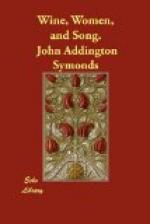She looked upon the green
sward, where
A student lay
at leisure:
“What do you there,
young sir, so fair?”
“Come, play
with me, my treasure!”
A third seems to have been written in the South, perhaps upon the shores of one of the Italian lakes—Como or Garda.
THE MULBERRY-GATHERER.
No. 25.
In the summer’s burning
heat,
When the flowers were blooming
sweet,
I had chosen, as ’twas
meet,
’Neath an olive bough
my seat;
Languid with the glowing day,
Lazy, careless, apt for play.
Stood the tree in fields where
grew
Painted flowers of every hue,
Grass that flourished with
the dew,
Fresh with shade where breezes
blew;
Plato, with his style so rare,
Could not paint a spot more
fair.
Runs a babbling brook hard
by,
Chants the nightingale on
high;
Water-nymphs with song reply.
“Sure, ’tis Paradise,”
I cry;
For I know not any place
Of a sweeter, fresher grace.
While I take my solace here,
And in solace find good cheer,
Shade from summer, coolness
dear,
Comes a shepherd maiden near—
Fairer, sure, there breathes
not now—
Plucking mulberries from the
bough.
Seeing her, I loved her there:
Venus did the trick, I’ll
swear!
“Come, I am no thief,
to scare,
Rob, or murder unaware;
I and all I have are thine,
Thou than Flora more divine!”
But the girl made answer then:
“Never played I yet
with men;
Cruel to me are my kin:
My old mother scolds me when
In some little thing I stray:—
Hold, I prithee, sir, to-day!”
A fourth, consisting of a short conventional introduction in praise of Spring, followed by a dialogue between a young man and a girl, in which the metre changes for the last two stanzas, may be classed among the pastorals, although it is a somewhat irregular example of the species.
THE WOOING.
No. 26.
All the woods are now in flower,
Song-birds sing in field and
bower,
Orchards their white blossoms
shower:
Lads, make merry in Love’s
hour!
Sordid grief hath flown away,
Fervid Love is here to-day;
He will tame without delay
Those who love not while they
may.
He.
“Fairest maiden, list
to me;
Do not thus disdainful be;
Scorn and anger disagree
With thy youth, and injure
thee.
“I am weaker than thou
art;
Mighty Love hath pierced my
heart;
Scarce can I endure his dart:
Lest I die, heal, heal my
smart!”
She.
“Why d’you coax
me, suitor blind?
What you seek you will not
find;
I’m too young for love
to bind;
Such vain trifles vex my mind.




